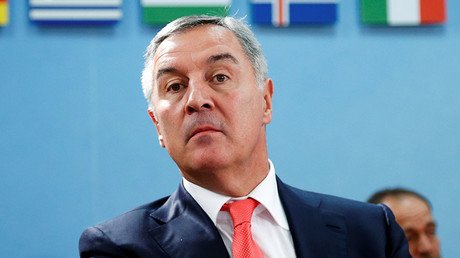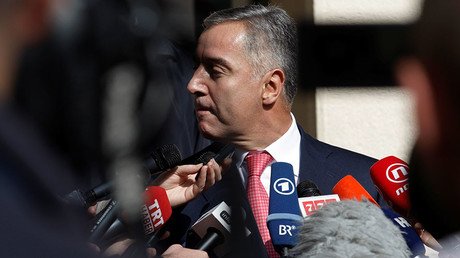‘Fake news recycling’: Russian Embassy calls out UK media over ‘Montenegro coup plot’ report
The Russian Embassy in London has rejected as pure innuendo a report in The Telegraph which claimed Moscow had conspired to overthrow Montenegro’s government during the 2016 poll, describing the report as recycled “fake news.”
“As usual, no evidence, pure innuendo,” the Russian mission posted on Twitter in response to the Telegraph’s lengthy article that ran under a sensational headline and then proceeded to accuse Russia of orchestrating a coup plot in Montenegro last fall, allegedly “to sabotage the country's plan to join NATO.”
. @Telegraph: recycling long-discarded news to stoke tensions with Russia. As usual, no evidence, pure innuendo. What next Sunday? pic.twitter.com/kc3Xgh7Jib
— Russian Embassy, UK (@RussianEmbassy) February 19, 2017
Citing unnamed “senior Whitehall sources,” the Telegraph, which is considered a rather respected publication, claimed in its report that Prime Minister Milo Djukanovic had been targeted by “Russian intelligence officers with the support and blessing of Moscow.”
The alleged plot “would have caused heavy bloodshed and plunged the tiny country into turmoil,” the paper told its readers in the unverifiable article, which was promptly picked up by other Western media.
The entire report is a recycling of long discarded news in order to “to stoke tensions with Russia,” according to the embassy. Moscow had in October already “categorically denied the possibility of official involvement in any attempts to commit any unlawful activities” during parliamentary elections in Montenegro.
The Montenegrin Special Prosecutor for Organized Crime, Milivoje Katnic, who at the time, accused a “powerful organization” of the coup plot, has also admitted that apart from several suspected “nationalists from Russia,” there's no “evidence that the state of Russia is involved in any sense.” There have also been no official inquiries from Podgorica to Moscow with regards to the alleged coup attempt, the Kremlin confirmed.
The Telegraph, however, backed their conspiracy with a photograph of Russian Foreign Minister Sergey Lavrov taken in December, apparently after he laid a wreath at the Liberators of Belgrade memorial and posed with locals, one of who happened to be an “alleged plotter Nemanja Ristic.”
READ MORE: Montenegro parliament strips 2 anti-NATO lawmakers of immunity
The report also said UK Foreign Secretary Boris Johnson and his US counterpart Rex Tillerson “discussed the issue” during their first meeting. It further cited the Montenegrin Defense Minister, Predrag Boskovic, as saying “there is ‘not any doubt’ that the plot was financed and organized by Russian intelligence officers alongside local radicals.”
To further reinforce their story about “one of the most blatant recent examples of an increasingly aggressive campaign of interference in Western affairs,” the publication boldly pointed to “Russia’s growing campaign of interference in the West,” by again rolling out accusations of Moscow’s alleged meddling in the US presidential election and supposed cyberattacks in Europe.
Independent journalist, Martin Summers, suspects the Telegraph could indeed have been “briefed by British intelligence,” and believes that allegations of Russia’s involvement in Montenegro are “part of an orchestrated campaign of defamation against Russia.”
“Frankly, in Britain, it is well know that the Daily Telegraph, which is aligned with the Conservative Party, is a favored mouthpiece for intelligence service disinformation,” Summers told RT. “They've printed lots of articles in the past which they've openly claimed were sourced in British intelligence, but then people have got to draw their own conclusions about whether they're true or not. Because both the Telegraph and British intelligence may and do lie.”















